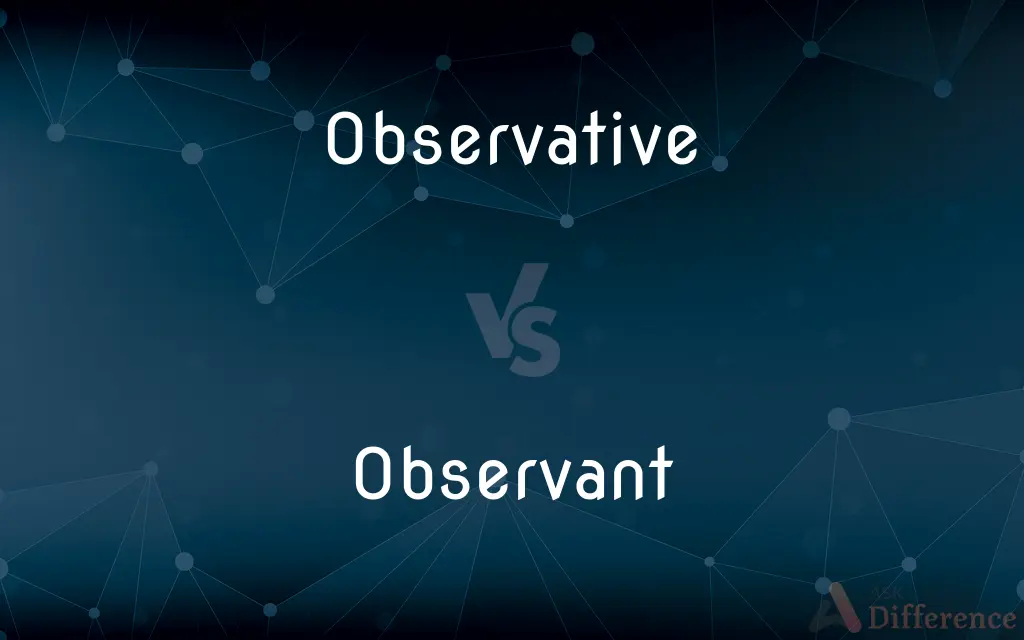Observative vs. Observant — What's the Difference?
By Tayyaba Rehman — Updated on October 20, 2023
Observative refers to a tendency or ability to observe, while observant describes someone who is attentive and notices details.

Difference Between Observative and Observant
Table of Contents
ADVERTISEMENT
Key Differences
Observative is a term that is linked to the process or act of observing. It implies an inclination or capability to make observations. Observant, however, carries a more active tone, denoting someone who is vigilant and attentive, especially to the nuances and details of their surroundings.
Observative may suggest a more passive or general tendency, implying that someone has an innate ability to observe or notice things. On the other hand, being observant involves actively paying attention, implying alertness and a keen awareness. Someone who is observant is typically perceived as being quick to detect or respond to slight changes, meanings, or signals.
The term "observative" can be associated with certain professions or activities that necessitate keen observation skills, like a researcher making observations in an experiment. Observant, conversely, is a term often used more broadly, describing a person's trait, such as an observant student who picks up on a teacher's subtle hints during a lecture.
Grammar-wise, both words function as adjectives. However, "observant" is more commonly used in everyday language and contexts. It's more likely for someone to describe another person as observant than observative, even though both can technically convey a similar meaning.
In summary, while observative and observant can sometimes be used interchangeably, they have nuanced differences. Observative leans more towards the capacity to observe, whereas observant implies an active attentiveness and alertness to details.
ADVERTISEMENT
Comparison Chart
Meaning
Tendency or ability to observe
Attentive and notices details
Usage
More passive, general tendency
Active, attentive awareness
Common Contexts
Professions, research
Describing personal traits
Frequency in Language
Less common
More common
Implication
Capability or inclination
Vigilance, keen awareness
Compare with Definitions
Observative
Relating to the act of observing.
His observative skills were honed during his research years.
Observant
Adhering strictly to religious or moral practices.
He was observant of all the religious customs and traditions.
Observative
Indicative of a person's inclination to observe.
His observative tendencies made him a great fit for detective work.
Observant
Having keen awareness or alertness.
Her observant eyes missed nothing during the inspection.
Observative
Pertaining to keen observation abilities.
The observative nature of the study yielded detailed results.
Observant
Demonstrating vigilance or attentiveness.
Observant guards are crucial for maintaining security.
Observative
Having a propensity to notice or watch.
As an artist, she was deeply observative of the world around her.
Observant
Quick to notice or perceive things
Her observant eye took in every detail
Observative
Denoting a passive observation.
Through observative practices, they recorded the animal's behavior.
Observant
Adhering strictly to the rules of a particular religion, especially Judaism
An observant Jew
Observative
Of, relating to, consisting of, or based on observation; given to observation, observant, attentive, heedful.
Observant
A member of a branch of the Franciscan order that followed a strict rule.
Observative
Observant; watchful
Observant
Having or showing keen perceptiveness; perceptive
An observant traveler.
An observant memoir.
Observative
Observing; watchful.
Observant
Diligent in observing a law, custom, duty, or principle
Observant of the speed limit.
Observant
Alert and paying close attention; watchful.
The observant police officer noticed that my tax disk was out-of-date.
Observant
Diligently attentive in observing a law, custom, duty or principle; regardful; mindful.
I was normally observant of the local parking restrictions.
Observant
Taking notice; viewing or noticing attentively; watchful; carefully attentive; as, an observant spectator; observant habits.
Wandering from clime to clime observant stray'd.
Observant
Submissively attentive; obediently watchful; regardful; mindful; obedient (to); - with of, as, to be observant of rules.
We are told how observant Alexander was of his master Aristotle.
Observant
One who observes forms and rules.
Observant
A sycophantic servant.
Silly ducking observants,That stretch their duties nicely.
Observant
An Observantine.
Observant
Paying close attention especially to details
Observant
Quick to notice; showing quick and keen perception
Observant
(of individuals) adhering strictly to laws and rules and customs;
Law-abiding citizens
Observant of the speed limit
Observant
Quick to notice or perceive things.
Being observant, she immediately noticed the change in his mood.
Observant
Paying close attention, especially to details.
The observant student caught the subtle hint the teacher gave.
Common Curiosities
Is "observative" a commonly used word in English?
"Observative" is less commonly used compared to "observant."
Can "observative" and "observant" be used interchangeably?
While they can sometimes be used interchangeably, they have nuanced differences, with "observative" suggesting a capability and "observant" implying active attentiveness.
Can "observant" relate to religious practices?
Yes, "observant" can also mean adhering strictly to religious or moral practices.
Is there a noun form for "observant"?
The noun form related to "observant" would be "observance."
Can "observative" denote passive observation?
Yes, "observative" can imply a more passive or general observation.
Which term is more likely to describe a person's nature or trait?
"Observant" is more likely used to describe a person's nature or trait.
Is "observative" linked to any specific contexts or professions?
"Observative" might be associated with professions or activities requiring keen observation, like research.
Do both "observative" and "observant" function as adjectives?
Yes, both "observative" and "observant" function as adjectives.
Can "observative" be used to describe a methodology?
Yes, "observative" can describe a methodology that revolves around observation.
Does "observant" suggest a general capability or an active act of observing?
"Observant" suggests an active act of observing.
Which word is more suitable for describing someone's general inclination to observe?
"Observative" would be more suitable for describing someone's general inclination to observe.
Is there a noun form for "observative"?
The noun form related to "observative" would be "observation."
Which word, between "observative" and "observant", has a more active connotation?
"Observant" has a more active connotation.
Which word implies more alertness and keen awareness?
"Observant" implies more alertness and keen awareness.
Which word is more prevalent in everyday language?
"Observant" is more prevalent in everyday language.
Share Your Discovery

Previous Comparison
Gigabit vs. Gigabyte
Next Comparison
Utilise vs. UtilizeAuthor Spotlight
Written by
Tayyaba RehmanTayyaba Rehman is a distinguished writer, currently serving as a primary contributor to askdifference.com. As a researcher in semantics and etymology, Tayyaba's passion for the complexity of languages and their distinctions has found a perfect home on the platform. Tayyaba delves into the intricacies of language, distinguishing between commonly confused words and phrases, thereby providing clarity for readers worldwide.














































